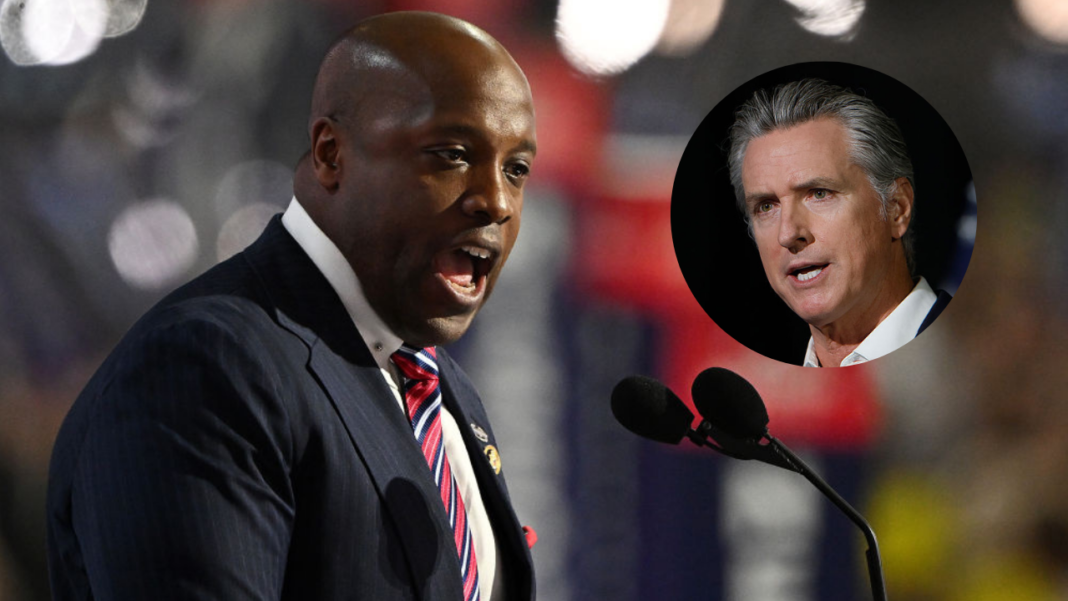Wesley Hunt’s Critique of Gavin Newsom: A Look at Code-Switching and Its Implications
Texas Republican Congressman Wesley Hunt recently stirred the political pot with sharp criticisms aimed at California Governor Gavin Newsom, a rumored contender for the 2028 presidential race. The context of this exchange centers on Newsom’s recent appearance on the “All the Smoke” podcast, where his conversational style and reflections on his upbringing prompted Hunt to call out what he perceives as “code-switching.”
The Accusation of Code-Switching
Hunt, who represents Texas’s 38th Congressional District and identifies as a Black conservative, labeled Newsom’s manner of speaking while discussing his childhood experiences as code-switching. This term typically refers to the practice of altering one’s speech, behavior, or appearance based on the social context. Commenting on this during an episode of “The Benny Show,” Hunt characterized Newsom’s approach as pandering to a demographic he aims to court—in this case, Black Americans. He warns against the dangers of such tendencies among white liberal leaders, suggesting they reflect an underlying patronization rather than genuine connection.
Newsom’s Narrative on the Podcast
During his appearance on “All the Smoke,” Newsom shared personal anecdotes about growing up under challenging circumstances. He spoke of being raised by a single mother who juggled multiple jobs to provide for her family. His storytelling focused on relatable experiences, like using Wonder Bread for snacks and shooting hoops in the backyard. However, Hunt interpreted these reflections as dubious attempts to relate to Black culture, implying that they are insincere efforts at connecting with a community he believes Newsom does not fully understand.
Hunt’s Broader Critique of “Benevolent Liberals”
Hunt’s remarks extend beyond a specific critique of Newsom. He has expressed a broader concern about what he terms the “white benevolent liberals” who he argues do not see Black Americans as equals. He articulated that these individuals, often well-meaning, condescend by making assumptions about the capabilities of Black people. In his view, this paternalistic attitude manifests in policies and rhetoric that infantilize rather than empower.
By stating, “They talk down to us,” Hunt highlights a recurring theme in his discourse: the belief that certain political figures project an image of superiority by believing they must ‘help’ Black communities rather than engage with them as equals.
The Racism of Assumptions
Hunt’s strong language emphasizes his disdain for what he identifies as the racism inherent in assumptions about Black intellect and agency. He asserts that such liberal attitudes can be more harmful than overt racism, arguing that the expectation for Black Americans to rely on a perceived rescue from white counterparts undermines their independence and capabilities.
He criticized the idea of white politicians trying to claim camaraderie or kinship through token gestures or attempts to adopt cultural dialects, a practice he finds “disgusting.”
Governor Newsom’s Defense
In response to criticisms regarding his podcast appearance, the governor’s office sought to clarify his background. They noted that Newsom’s life experiences—growing up with a working mother—are reflections of his authentic upbringing rather than calculated strategies to gain favor with Black voters. A spokesperson emphasized that curiosity about his life would reveal the complexities of moving between different social environments.
The Intersection of Race and Politics
This exchange between Hunt and Newsom exemplifies a larger conversation about race in American politics, particularly the strategies used by politicians to connect with diverse voter bases. The concept of code-switching in political dialogue raises critical questions about authenticity and representation. Can a leader effectively relate to a community without appearing disingenuous? What constitutes respectful and genuine outreach?
In this charged political climate, discussions like these highlight the significance of understanding and acknowledging personal narratives while navigating the broader landscape of race and identity in America. As political figures increasingly seek to engage with voters from various backgrounds, the delicate balance between connection and authenticity remains a critical focus.



